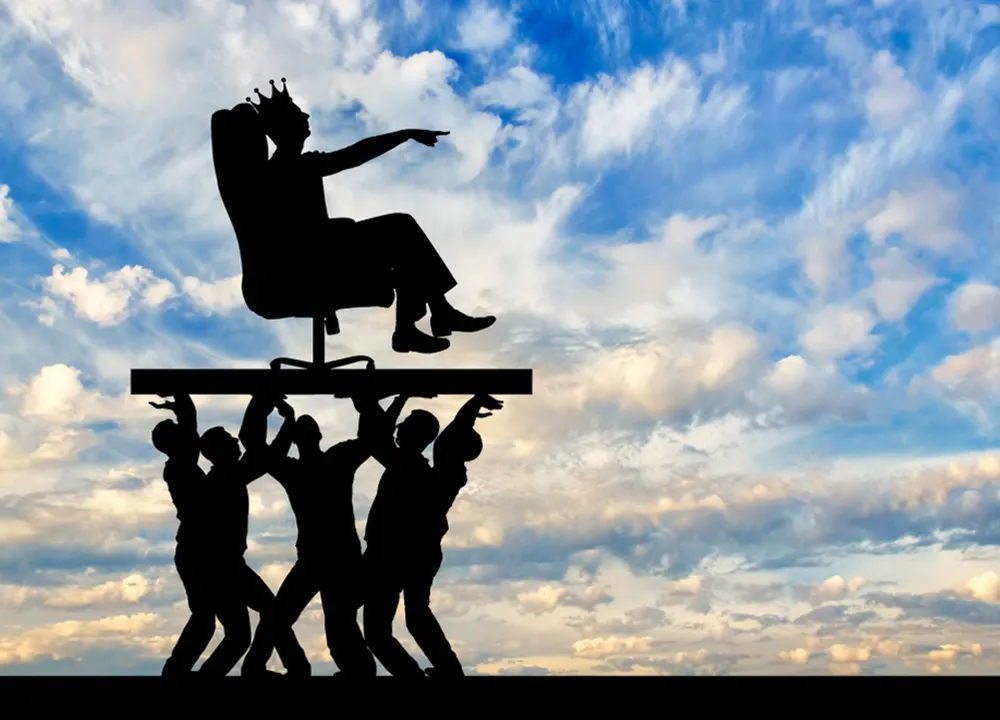Published on: April 7, 2025 at 6:19 pm
By Daniel Butcher
South Korea’s impeached president, Yoon Suk Yeol, declared martial law on December 3, 2024, sparking a national political crisis.
That tone-deaf declaration of martial law, recommended or enabled by the people he chose to surround himself with, could indicate narcissism, according to Academy of Management Scholar Tim Pollock of the University of Tennessee, Knoxville.
“Look at who President Yoon appointed, who his close advisors were, how so many of his political appointees to the Defense Ministry and elsewhere on the State Council were not people with depth of experience, but rather were people he went to high school with,” Pollock said. “He surrounded himself with this close coterie of yes-men and yes-women who are going to tell him what he wants to hear and who don’t have strong credentials, so they’re even more reliant on him for their position.
“This is the kind of stuff that can happen to leaders who insulate themselves from criticism like what we saw in South Korea, where President Yoon decided to declare martial law, and it blew up in his face so spectacularly,” he said. “It wasn’t well-thought-out; even if he was trying to do what he thought was best, he didn’t even manage it very effectively, because he didn’t know that he wasn’t talking to everybody and didn’t have widespread support.
“He was more isolated by his core group of underqualified advisers who were out of touch with public opinion.”
A symptom of narcissistic leaders surrounding themselves with yes-men and ignoring other perspectives is a lack of connection with their broader communities and key audiences, Pollock said.
“Narcissism is leading them to take actions that are really hurting them and that hurt their country and create these giant crises,” he said. “Choo Kyung-ho, the Deputy Prime Minister, Minister of Economy, and member of the National Assembly of the Republic of South Korea is from the president’s party, and they used to be close.
“They were both prosecutors together, but then they had a falling out and President Yoon saw him as an enemy because he was no longer following along with everything that Yoon wanted to do, and narcissists can’t tolerate criticism.”
-
Daniel Butcher is a writer and the Managing Editor of AOM Today at the Academy of Management (AOM). Previously, he was a writer and the Finance Editor for Strategic Finance magazine and Management Accounting Quarterly, a scholarly journal, at the Institute of Management Accountants (IMA). Prior to that, he worked as a writer/editor at The Financial Times, including daily FT sister publications Ignites and FundFire, as well as Crain Communications’s InvestmentNews and Crain’s Wealth, eFinancialCareers, and Arizent’s Financial Planning, Re:Invent|Wealth, On Wall Street, Bank Investment Consultant, and Money Management Executive. He earned his bachelor’s degree from the University of Colorado Boulder and his master’s degree from New York University. You can reach him at dbutcher@aom.org or via LinkedIn.
View all posts
Up next....
Research Findings Are Not Reaching Business Leaders
Source: Shutterstock
By Nick Keppler
There are now about 400 journals for management as an academic field, producing about 12,000 published articles a year in total. However, top decision-makers rarely learn anything from them, said Academy of Management Scholar Herman Aguinis of the George Washington University School of Business.
“Many of us are concerned that the research we do is not being used to the extent that we would like, and it’s called a research-practice gap,” Aguinis said. “Also, there’s a research-policy gap,” stemming from political leaders’ lack of familiarity with research produced in the field of management.
This gap is particularly frustrating, said Aguinis, because scholars on management and organizations have produced a wealth of scientifically sound research on issues that have dominated the news in 2025, including the downsizing of the federal government, the measurement of job performance, discrimination and diversity, equity, and inclusion policies, and the implementation of AI in workplaces.
“If you want to build a bridge, you will talk to the top engineers, but management scholars are not consulted with the same regularity,” said Aguinis.
This is not entirely the fault of those who could potentially benefit from our research, Aguinis added. Academic journals are often insular and publish articles that only make small contributions to our understanding of critical organizational phenomena. Also, the compensation and reward systems motivate academics to write mainly for other academics, not managers, business leaders, and decision-makers.
“For several reasons, much of our research is not aimed at affecting practice,” Aguinis said. “If you read the typical article of, let’s say, 20 pages, you may find one or two paragraphs at the end saying ‘implications for practice.’”
The research is not lost on everyone. A small number of elite companies look to academia to improve performance. Google is well-known for hiring Ph.D. holders, not just for computer-science roles but also for management and creative jobs. Marriott is a sponsor of doctoral development programs.
These companies reap the benefit in reputation, said Aguinis, often appearing in lists such as Fortune Magazine’s “Best Companies to Work For” series.
“All of these companies, all of them, employ Ph.D.s who actually read the research, and they try to implement leadership strategies and management practices that are consistent with what research says aligns with best-practice evidence as published in scholarly journals,” he said.
-
Nick Keppler is a freelance journalist, writer, and editor. He has written extensively about psychology, healthcare, and public policy for The New York Times, The Washington Post, Slate, The Daily Beast, Vice, CityLab, Men’s Health, Mental Floss, The Financial Times, and other prominent publications (as well as a lot of obscure ones). He has also written podcast scripts. His journalistic heroes include Jon Ronson, Jon Krakauer, and Norah Vincent.
Before he went freelance, he was an editor at The Houston Press (which is now a scarcely staffed, online-only publication) and at The Fairfield County Weekly (which is defunct).
In addition to journalism, he has done a variety of writing, editing, and promotional development for businesses and universities, including the University of Pittsburgh and Carnegie Mellon University, and individuals who needed help with writing projects.
View all posts
Up next....
Why CSR Is Still Vital for Companies
Source: Shutterstock
By Nick Keppler
Any act of corporate wrongdoing—real or perceived—can be publicized worldwide instantly via the internet and social media. This has made ideas of sustainability and corporate social responsibility (CSR)—which includes organizations’ initiatives geared toward achieving environmental, ethical, philanthropic, and financial objectives—increasingly important and far-ranging, said Academy of Management Scholar Herman Aguinis of the George Washington School of Business.
“Because of information flow across the internet, now we know about sweatshops, we know about companies polluting the environment, and we know about companies that are abusing and taking advantage of farmers and not providing benefits,” he said.
Not coincidentally, measurements of CSR initiatives that make a positive societal impact have grown not just to consider the company’s adherence to laws and regulations but also its impact on globalization, technological developments, fair trade, workers’ rights, pay equity, pollution, habitat destruction, and climate change.
“The expectations have changed mostly because of pressure from the outside,” Aguinis said.
To manage an increasingly complex set of considerations related to CSR and sustainability, many companies have emphasized the three Ps, Aguinis said: people, the planet, and profit.
The “people” aspect does not only encompass employees and shareholders but also a wide span of stakeholders, including “the communities you serve, your customers, the communities around your business locations,” he said.
For example, Intel, a computer components manufacturer, holds town-hall meetings before finalizing plans to open new chip plants.
Small steps like these make operating the business easier and bolster its reputation, Aguinis said.
“The argument is that you can do good and do well at the same time, that those things go hand in hand, is replacing an older cynical argument that some economists have proposed, which is that your priority and loyalty group and number-one stakeholder is your shareholders,” he said. “‘You should just be making money for them, and anything else that you do that goes outside of that is not your mandate, not your responsibility.’”
That thinking—exemplified by American economist Milton Friedman—will not help companies stand up to increasing social pressure and could hurt their reputation, Aguinis said.
“The CSR movement has changed because customers, consumers, vendors, and partners want companies to do more to impact society positively.”
-
Nick Keppler is a freelance journalist, writer, and editor. He has written extensively about psychology, healthcare, and public policy for The New York Times, The Washington Post, Slate, The Daily Beast, Vice, CityLab, Men’s Health, Mental Floss, The Financial Times, and other prominent publications (as well as a lot of obscure ones). He has also written podcast scripts. His journalistic heroes include Jon Ronson, Jon Krakauer, and Norah Vincent.
Before he went freelance, he was an editor at The Houston Press (which is now a scarcely staffed, online-only publication) and at The Fairfield County Weekly (which is defunct).
In addition to journalism, he has done a variety of writing, editing, and promotional development for businesses and universities, including the University of Pittsburgh and Carnegie Mellon University, and individuals who needed help with writing projects.
View all posts
Up next....
Why Success Can Be the Enemy of Innovation in the Age of AI
Source: Shutterstock
By Jason Collins
A new Pew Research Center report reveals that public optimism remains low regarding the potential impact of AI in the workplace. However, refusing to work with new technologies can cause even the largest organizations to fail as this technology changes the game across many industries.
Academy of Management Scholar Wendy Smith of the University of Delaware reveals that it isn’t the small businesses that are most at risk, but rather larger organizations that choose to rely on what they know works. Smith calls this the paradox of success.
“The companies who are at the top of their market have the most to lose and therefore don’t want to take risks and thus are the most entrenched in what they already do,” Smith said. “Researchers call this the ‘paradox of success’ where successful companies are the ones that fail to adopt new technologies and innovation.”
Because smaller organizations don’t have this burden, they have nothing keeping them from trying new things and adopting new technologies such as AI and robotic process automation. History shows us that success can be an enemy of innovation. Smith draws parallels to brands such as Kodak and Polaroid, which failed to make the digital photography transition.
“BlackBerry was this amazing early force of the smartphone but could not compete when brands like Apple came into the market with updated technologies,” Smith said. “Blockbuster Video couldn’t make the transition from VHS tapes and DVDs to streaming when Netflix then took over.
“So, we see that story happen again and again and again,” she said.
If the past has taught us anything, it is that relying on past success without monitoring new technologies, tracking consumers’ preferences, and cultivating boldness in strategic planning prevents innovation.
“I think we’re going to see the same thing now,” Smith said. “And so there is wisdom in ‘Don’t throw out the baby with the bathwater.’
“It’s totally new technology, but leaders should be learning from history what it means to innovate within an existing company,” she said.
Up next....
Rethinking Management in the Age of AI
Source: Shutterstock
By Jason Collins
More than one in four workers are worried that AI will lead to job losses, according to a recent poll from the conciliation service Acas. Currently, leaders and management have a key role in shaping how employees use AI during this technological transition.
Instead of viewing AI as a potential replacement for human workers, management can be more effective by considering how people can interact with technology to boost productivity and efficiency. Academy of Management Scholar Wendy Smith of the University of Delaware said that doing so requires that senior management shift their mindsets to frame the relationship between humans and AI in the context of what works in their organization.
“One of the roles of leaders is to understand how AI and humans work together,” Smith said. “We tend to think of how technology will replace human, which is an either/or mindset.”
Instead, she urged leaders to frame technology as a complement to, not a replacement for, employees.
“Leaders can adopt a both/and approach, exploring how AI and employees work together to lead to even better outcomes,” Smith said.
Smith advised management to adopt the mindset of using AI to make their team members’ jobs easier and free up time for them to focus on strategic planning and other tasks that require higher-order thinking.
“AI works better because the person and the technology are in a relationship with one another,” Smith said. “We can do better when we ask ourselves, ‘What is this technology good for? What is my level of understanding of it? What am I good for, what do I do well, and how could I work effectively and interdependently with this technology?’”
Smith said that she believes that while AI can perform certain tasks more efficiently than humans, it ultimately comes down to collaboration. For example, the better the prompts that humans give to a generative AI platform, the better the outputs of the gen AI software. Human expertise can help evaluate and assess the quality of the AI responses.
“If AI is going to work to the best of its capabilities, it’s because I bring real and important contributions to the table,” Smith said.
For managers, the question is no longer whether to use AI but how to grow with it and encourage rank-and-file employees to do the same. Smith said this will require “growth and thoughtfulness.” Smith also underscored the advice for people to “recognize that AI and humans work better together, and to be in learning and growth mode.”
Up next....
Human-Centered Leaders Steer Through the AI Anxiety Curve
Source: Shutterstock
By Jason Collins
Established generative AI platforms such as OpenAI’s ChatGPT, Google’s Gemini (formerly Bard), Anthropic’s Claude, and Jasper (formerly Jarvis) have been competing for users and market share, and the level of competition in the space will continue to grow with the rise of non-U.S. AI startups, including Chinese company DeepSeek. The impact of this new technology in the workplace is far-reaching, and leaders need to guide their organizations’ employees through their psychological resistance with an approach that embraces innovation while acknowledging the potential positive and negatives effects on humans and our emotions.
Academy of Management Scholar Wendy Smith of the University of Delaware noted that history has shown us that when a new generation of technology is introduced, such as generative AI, we resist it psychologically. Smith explained that AI is a great example of this.
“AI introduces all kinds of uncertainty and possibilities, some exciting, others anxiety-inducing,” Smith said.
“It’s a wide range of possibilities, which includes automation of manual tasks, role changes, and job losses, and that type of uncertainty leads us to psychologically fill in the gaps with all kinds of things that we’re afraid of,” she said.
It introduces the question, “What happens with the people who had been doing the work but whose skills are no longer relevant or up to date?”
This AI anxiety curve is not a new concept. Smith cited the introduction of once-disruptive technologies that we now take for granted.
“We’ve seen that story play out in every industry,” Smith said. “For example, we’ve seen how the introduction of the personal computer overtook the mainframe, and the introduction of cloud computing overtook the personal computer.
“We’ve seen it in the past, and when it comes to technology in general is, as a result of this anxiety, there’s this curve of people adopting the anxiety,” she said.
Smith noted that this spread of emotional reactions results in a wave of people, especially in the workplace, feeling this anxiety and thus holding out for the new technology to become more established before gauging its implications, or dismissing its potential to create positive outcomes. Leaders cannot afford to ignore this anxiety. If they are to continually innovate, they need to take into account employees’ emotional responses.
“Effective innovation requires attention to, not rejection of, employees’ emotional experiences,” Smith said.
“The best leaders navigate this learning and adoption curve across the organization with empathy for their workers and clarity on the objectives for deploying the technology with a human-centered approach to leadership that also embraces innovation,” she said.
Up next....
The New Reality: Leaders Have Less Control, Need More Courage
Source: Shutterstock
By Jason Collins
For decades, the prevailing wisdom for business leaders was to stay out of politics. Neutrality was considered the safest, most responsible stance for corporate executives and board members to take. But today that approach is increasingly untenable. From the COIVID-19 pandemic to intensifying political polarization and controversy, leaders now find themselves at the center of public debates whether they choose to engage with them or not.
For leaders, silence is a statement, and political neutrality is no longer a viable option, according to Academy of Management Scholar Wendy Smith of the University of Delaware.
“It used to be that there were checks and balances in the U.S. government,” Smith said. “The market was separate from the state, or companies were separate from the government, and that is no longer the case.”
To survive and thrive in this era when economics and politics collide to sow chaos, Smith said that leaders should “talk about strategizing as a verb rather than having a strategy.” For Smith, this means considering “the conditions that we need to bring a team together to be agile and moving, even as we need to communicate out to our people some sense of security.”
Strategic decisions from supply-chain choices to remote, hybrid, or return-to-office work policies have become flashpoints in boardroom and C-suite conversations and political discourse. Leaders now must navigate complex social, economic, and political terrains, speak out on pressing issues, and align their actions with values that resonate with stakeholders—employees, shareholders, customers, and communities alike.
Companies’ leaders have had to deal with uncertainties for a long time, but Smith said many of their strategies and their organization’s systems are antiquated. According to Smith, nowadays leaders are learning that they need to “communicate to their people, optimize their processes, and cultivate openness in their conversations, but not pretend that there’s certainty of what the future will bring, because that’s just false hope.”
Smith acknowledged that leaders are faced with unique challenges in this current political landscape characterized by dissention, frustration, anger, and unpredictability, making it difficult to navigate socioeconomic volatility.
“One of the consequences of this highly polarized world is that leaders, because of the polarization, are being attacked for polarizing positions,” Smith said.
In this current era, leadership is less about having definitive answers and more about asking incisive questions, listening to a range of perspectives, evaluating various responses to difficult circumstances and controversial issues through an ethical lens, and having the courage of one’s convictions.
“We want leaders who are competent and courageous, not stepping away from that responsibility to take a stand and speak up for what’s right because it is so risky,” Smith said.
-
Daniel Butcher is a writer and the Managing Editor of AOM Today at the Academy of Management (AOM). Previously, he was a writer and the Finance Editor for Strategic Finance magazine and Management Accounting Quarterly, a scholarly journal, at the Institute of Management Accountants (IMA). Prior to that, he worked as a writer/editor at The Financial Times, including daily FT sister publications Ignites and FundFire, as well as Crain Communications’s InvestmentNews and Crain’s Wealth, eFinancialCareers, and Arizent’s Financial Planning, Re:Invent|Wealth, On Wall Street, Bank Investment Consultant, and Money Management Executive. He earned his bachelor’s degree from the University of Colorado Boulder and his master’s degree from New York University. You can reach him at dbutcher@aom.org or via LinkedIn.
View all posts
Up next....
Why We Love Time-Travel Tales
Source: Shutterstock
By Daniel Butcher
People love stories that involve time travel, from books such as The Time Machine by H.G. Wells, A Wrinkle in Time by Madeleine L’Engle, and the Outlander series by Diana Gabaldon (adapted into a TV series) and shows such as Doctor Who and Quantum Leap to comedy movies such as Groundhog Day, Bill & Ted’s Excellent Adventure, and Hot Tub Time Machine and action/adventure films such as the Back to the Future and Terminator series.
What’s so universally compelling about the concept?
Academy of Management Scholar Abbie Shipp of Texas Christian University said that the appeal of time-travel stories is that people often imagine what it would be like to travel backward and forward in time.
“We live in any given moment, but in those moments as we mentally time travel, we can remember select things, we can forecast things, and so we can create whatever story we want,” Shipp said. “When we see it in movie or show form, it fascinates us to be able to move into the future and see, ‘How did that play out?’—there’s a little bit of certainty that comes with that, so that’s one element.
“Another part of that is that we forget how things change,” she said. “For example, we assume, ‘If I am in an accident and suffer an injury and I lose the use of my legs, I would be so unhappy,’ and there’s a lot of research on this; yet we know that people have happiness set points.
“We forget the resilience that we have over time.”
Popular fantasy
“I was just thinking about this today in terms of the weather,” Shipp said. “We’re having this really weird cold snap in Texas, and so, of course, my brain is thinking, ‘Well, if this is what the weather is going to be from now on, I’m going to move someplace else.’
“But that thought assumes this experience would be the same in another 10 years, rather than be temporary or change in another way,” she said. “What do I know about what the future holds?
“Some of those time-travel films get us thinking about the elements we’ve forgotten about the past or what might be in the future, so it’s as much a fantasy as it gives us something to sink our teeth into when we think about what’s continuous versus what’s changing.”
A sample of Shipp’s AOM research findings:
-
Daniel Butcher is a writer and the Managing Editor of AOM Today at the Academy of Management (AOM). Previously, he was a writer and the Finance Editor for Strategic Finance magazine and Management Accounting Quarterly, a scholarly journal, at the Institute of Management Accountants (IMA). Prior to that, he worked as a writer/editor at The Financial Times, including daily FT sister publications Ignites and FundFire, as well as Crain Communications’s InvestmentNews and Crain’s Wealth, eFinancialCareers, and Arizent’s Financial Planning, Re:Invent|Wealth, On Wall Street, Bank Investment Consultant, and Money Management Executive. He earned his bachelor’s degree from the University of Colorado Boulder and his master’s degree from New York University. You can reach him at dbutcher@aom.org or via LinkedIn.
View all posts
Up next....
What to Do When Your Boss Asks You to Work Late
By Daniel Butcher
You recently started a new job and your boss asks you to work late. Do you say yes, do you try to come up with a compromise, or do you say, “no way!”?
Academy of Management Scholar Abbie Shipp of Texas Christian University, who coauthored an Academy of Management Review article related to this topic with TCU colleague Hettie Richardson, said that when she had recently begun a new job as an assistant professor, there was an important meeting scheduled from five to nine p.m.
“I said, ‘A work meeting scheduled for after most people have left? What are you doing? I have to get home and take care of my son,’ but to this group, that was just normal because they wanted the privacy for the meeting’s sensitive topic,” Shipp said.
“When we get in situations like these, we have choices—we can either just go to the meeting deliberately and entrain to that schedule, or maybe we could passively push back and say, ‘I’ll be there, but I’m only going to stay from five to seven,’ or we could actively resist and say, ‘This isn’t right; this disadvantages people who don’t want to work in the evenings so I’m not going,’” she said. “Yet there are different outcomes that can happen in response to that decision.
“Sometimes it can be good because you may resist a meeting that others also think is mistimed—but other times you may be viewed as a rebel who is unwilling to adapt your schedule.”
Beyond meetings, Shipp said that there are other examples where it isn’t a simple choice between full compliance versus resistance.
“There are times when your preferred timing doesn’t match the situation, but you respond by creating an even more strict handling of time,” Shipp said. “Maybe you’re in an environment that doesn’t give you any structure about when and where to work but only evaluates your outcomes, given that different people experience time individually, they may each put their own structure in place, and that may further inform what happens at the team or the organizational level.
“Because individuals have views of time or ‘temporal schemata’ for how they interpret their schedules, they view the world through this temporal lens,” she said. “We each have these temporal schemata based on childhood and early work experiences, and that lens is how we each think about time and use time individually.
“We can’t assume that people will just naturally entrain to team or organizational schedules; we really have to look at each individual and see if there’s more going on behind the scenes.”
A sample of Shipp’s AOM research findings:
-
Daniel Butcher is a writer and the Managing Editor of AOM Today at the Academy of Management (AOM). Previously, he was a writer and the Finance Editor for Strategic Finance magazine and Management Accounting Quarterly, a scholarly journal, at the Institute of Management Accountants (IMA). Prior to that, he worked as a writer/editor at The Financial Times, including daily FT sister publications Ignites and FundFire, as well as Crain Communications’s InvestmentNews and Crain’s Wealth, eFinancialCareers, and Arizent’s Financial Planning, Re:Invent|Wealth, On Wall Street, Bank Investment Consultant, and Money Management Executive. He earned his bachelor’s degree from the University of Colorado Boulder and his master’s degree from New York University. You can reach him at dbutcher@aom.org or via LinkedIn.
View all posts
Up next....
When It’s Time to Look for a New Job
By Daniel Butcher
Sometimes it makes sense to say “This too shall pass” and weather the storm at work. In other cases, it’s best to jump ship.
Academy of Management Scholar Abbie Shipp of Texas Christian University, who coauthored an Academy of Management Review article on how people craft career narratives that affect how they fit in their current organization with Karen Jansen of North Carolina State University, said few jobs are forever.
“You thought you were going to stay here forever, and then your boss suddenly leaves, and you get a horrible boss,” Shipp said. “That’s a big event in your story, and how well you fit now has changed, so in response to the question ‘Am I going to stay here?’ is now very different.
“The fit literature had not addressed that question of change, so we have done some additional work to really explore what that means; we can’t just ask people, ‘Do you fit?’ at a moment in time to get the whole story,” she said. “You and I might report the same numerical number of job satisfaction on a questionnaire, but if the trajectory you’re expecting is going down and the trajectory I’m expecting is going up, I’m going to be super happy to stay, whereas you’re going to be planning a departure—yet, on the engagement survey, it will look exactly the same.
“It’s really about bringing in that temporal context.”
It’s easy to stagnate in a job even after the situation changes for the worse due to inertia. Employees shouldn’t be afraid to examine their changing work environment and make a call whether it still makes sense to be loyal to their employer. As for bosses, they need to actively try to boost morale after a period of more changes than usual.
“What it means for leaders is: You have to ask people, ‘What’s your story? Where have you been? Where are you going, and how does that provide an incentive for you to stay here, at least for the time being?” Shipp said. “We call it temporal baggage.
“When you come to an organization, you bring the temporal baggage of the past and the future, which is, ‘Where have you been before, and what do you expect if you’re going to stay here?’ and we have to understand that whole story,” she said.
“We ask about fit in the middle of things at one point in time, but we need to understand that whole story, and we have to keep asking, because it will naturally change as personal situations or work events change.”
A sample of Shipp’s AOM research findings:
-
Daniel Butcher is a writer and the Managing Editor of AOM Today at the Academy of Management (AOM). Previously, he was a writer and the Finance Editor for Strategic Finance magazine and Management Accounting Quarterly, a scholarly journal, at the Institute of Management Accountants (IMA). Prior to that, he worked as a writer/editor at The Financial Times, including daily FT sister publications Ignites and FundFire, as well as Crain Communications’s InvestmentNews and Crain’s Wealth, eFinancialCareers, and Arizent’s Financial Planning, Re:Invent|Wealth, On Wall Street, Bank Investment Consultant, and Money Management Executive. He earned his bachelor’s degree from the University of Colorado Boulder and his master’s degree from New York University. You can reach him at dbutcher@aom.org or via LinkedIn.
View all posts
Up next....
Understanding Time to Manage It Better
By Daniel Butcher
Time flies when you’re having fun or in the zone at work, but it crawls when you’re in pain or doing a boring task.
Academy of Management Scholar Abbie Shipp of Texas Christian University, who coauthored an Academy of Management Annals article on that topic with Karen Jansen of North Carolina State University, said that a key element of subjective time is people’s interpretation and perception of time itself.
“Working on the expense report, even 15 minutes probably feels like forever versus 15 minutes in a crisis situation feels like a blink of an eye,” Shipp said. “There are different ways in which we perceive time itself, the units of time, and that shapes how we structure our time.
“That could be things like deadlines—say you asked me, ‘Hey, can you get this to me by Thursday?’” she said. “That may seem like a very long deadline to you, but if I have a very busy week, maybe that feels like that’s way too soon.
“It has implications for how and when we work, especially how we work with each other.”
In Shipp’s and her colleagues’ research on different elements of subjective time, they looked at all the different ways in which people have studied time, and which aspects of it scientists haven’t studied. People who take time to examine how they perceive and interpret time may be able to improve their time management.
“We found was there are many gaps, both in how researchers and practitioners look at time,” Shipp said. “We found many ways in which you can better use your time if you think about it subjectively and not just objectively.”
A sample of Shipp’s AOM research findings:
-
Daniel Butcher is a writer and the Managing Editor of AOM Today at the Academy of Management (AOM). Previously, he was a writer and the Finance Editor for Strategic Finance magazine and Management Accounting Quarterly, a scholarly journal, at the Institute of Management Accountants (IMA). Prior to that, he worked as a writer/editor at The Financial Times, including daily FT sister publications Ignites and FundFire, as well as Crain Communications’s InvestmentNews and Crain’s Wealth, eFinancialCareers, and Arizent’s Financial Planning, Re:Invent|Wealth, On Wall Street, Bank Investment Consultant, and Money Management Executive. He earned his bachelor’s degree from the University of Colorado Boulder and his master’s degree from New York University. You can reach him at dbutcher@aom.org or via LinkedIn.
View all posts













